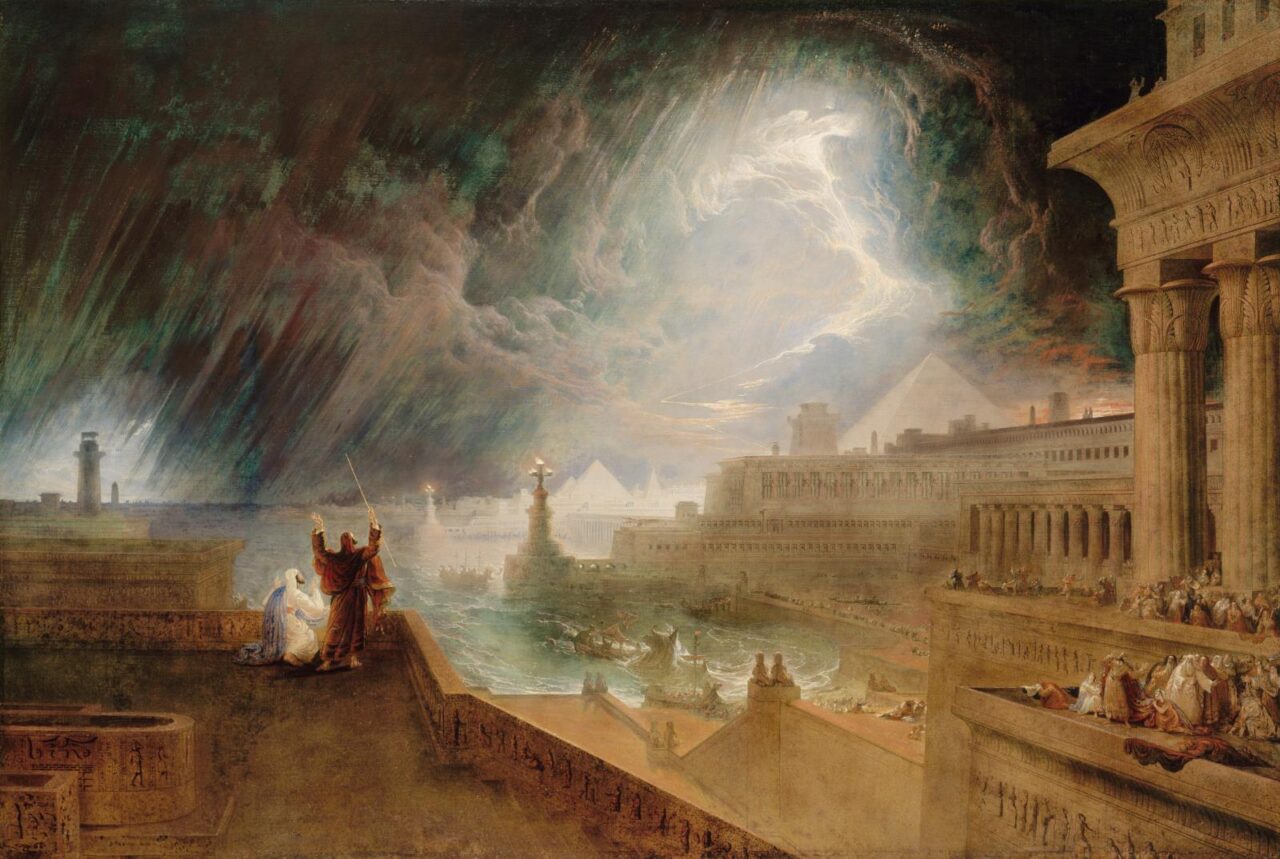This is adapted from a drash Z. S. will read this weekend at Devar Emet Messianic Congregation. A drash is a brief takeaway from the weekly cycle of texts.
Torah: Exodus 6:2-9:35
Haftarah: Ezekiel 28:25-29:21
Brit Chadashah: Revelation 15-16
Do you remember the early days of the Coronavirus? I remember studying Va’era last year, in late January, and thinking, “this virus in China might be kind of similar to the plagues we’re reading about.” Well, here we are, again reading the same parashah a year later with some hindsight. I hope this week’s parashah can give us some perspective on the past twelve months of plagues (even though they are not the same as those in Exodus). As we see in Exodus, God has a purpose behind every plague He sends on us. He is trying to communicate something to us, to wake us up from our complacency and free us from worldly oppression, so that we might live in a God-glorifying manner.
In the Torah portion, God sends seven plagues on Egypt: the waters of the Nile turn to blood; frogs, gnats, and flies infest the land; cattle fall dead; Egyptians suffer from boils; and a hailstorm kills humans, animals, and even trees. We must look back on these plagues as tragedies. Why does God send all these plagues on Egypt? Two reasons: God reveals His identity 1) to Egypt and 2) to Israel. He says over and over again that He is doing this to show Egypt that He is the Lord. If only Pharaoh would recognize God in a committed fashion, these plagues would have been averted. But the other reason God sent these plagues was to show Israel their God. The people of Israel, toiling under the whip, became numb to their origins, their calling, and their relationship with God. Israel had gone through over four hundred years of a perverse assimilation. That’s why the parashah begins with a communication from God to Moses about God’s identity and the relationship He established with the Patriarchs. It’s also why the text carefully recounts Moses and Aaron’s lineage. All this serves to bring Moses and Aaron out of Egypt’s oppressive assimilation and show us where the Israelites come from. God then gives Moses a synopsis of His plan for freeing Israel and granting them the Promised Land. But when Moses proposes the plan to the people of Israel, they do “not listen to him because of their broken spirit and cruel bondage” (Ex. 6:9). They were probably more ready to believe (erroneously) that their toeses were roses, than that God might free them from slavery and give them their own land! It’s hard to see a prosperous future when you are under the crushing weight of oppression. So God used plagues to wake up the people of Israel and remind them of the special favor He reserved for them. Imagine being an Israelite, enslaved by the clean-shaven elites of Egypt, when suddenly plagues hit the whole country—except your people. God required this painful process of plagues in order to “make a distinction between My people [Israel] and” Pharaoh’s people (Ex. 8:19). This is God’s special way of not only revealing Himself to His people, but also demonstrating His relationship with them.
The Haftarah portion recites God’s promise to gather “the house of Israel from the people among whom they are scattered” (Ek. 28:25). At the same time that God shows His holy wrath to the nations, He gives Israel the dream of building houses and planting vineyards in peace. Through Ezekiel, we learn that God’s redemption of Israel from Egypt applies not only to that single historical generation, but also to all of Israel in exile (including us). But it’s not just about us. God uses His redemption of exiled Israel to show the powerful nation Egypt His faithfulness, His justice, and His might. Time and again, through ancient and modern history, God’s punishment of those who persecute Israel, and God’s prospering of Israel, bears witness to God’s supremacy in human affairs.
Just as God sends seven plagues upon Egypt in our parashah, God also sends seven plagues on the earth in the Brit Chadashah portion. These include boils, turning the sea and rivers to blood, darkness, and hail. While not all the plagues correspond to each other, we do see some striking parallels. However, this time, before the plagues are released, John hears angels singing the song of Moses and the song of the Lamb, praising God for His deeds as “King of the nations.” (By the way, there’s a great rendition of this song by the Liberated Wailing Wall.) In the Exodus story, the children of Israel sing the song of Moses after God leads them out of Israel. In Revelation, the angels sing the song of Moses before they pour plagues upon the earth. This should give us perspective on the timeless truth of God’s sovereignty both before and after His acts of redemption.
With the Coronavirus, God has shown humanity its pathetic lack of control. We ought to have gained this perspective by now. But, like Pharaoh, we can tragically forget this lesson as quickly as the vaccine rolls out and the pandemic recedes. Instead, we must recognize God in the midst of the world’s oppression of our identity in Him. Pharaoh oppressed Israelites with physical exploitation, yes, but more importantly he broke their spirit. Today, many forms of spiritual oppression try to break our spirit: social media, political squabbles that distract, addictions of all kinds, acedia, Hollywood, worship of the individual, and unbiblical sexual norms; the list goes on. Let’s not assimilate and grow numb to worldly oppressions, but rather let us strive for holiness by finding our satisfaction in our Almighty God. Then we can truly rejoice in God, for His just and true ways will be revealed (Rev. 15:3-4) in us!


Leave a Reply